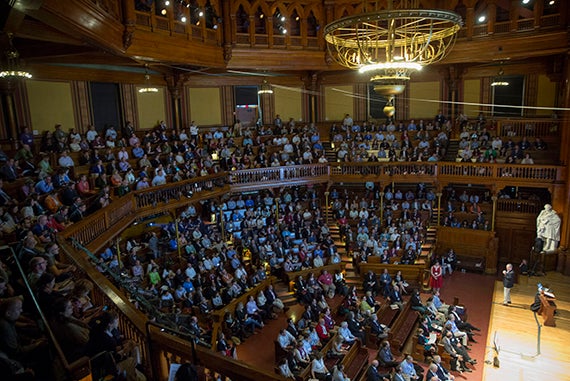A clearer role for MOOCs
Online courses are unlikely to take over higher education, Bacow says, but they can help revitalize it
Massive open online courses, or MOOCS, will not destroy the university as we know it, says Lawrence S. Bacow, member of the Harvard Corporation and former president of Tufts University. While this burgeoning educational trend may seem poised to undercut four-year residential colleges, it may not be the cost-conscious alternative it seems. But it may offer new opportunities — and new ideas — to revitalize higher education.
Bacow, J.D. ’76, M.P.P. ’76, Ph.D. ’78, delivered a talk titled “Online Learning: The Scourge or Savior of Higher Education” at Sanders Theatre on Thursday at the start of the Harvard IT Summit. Kicking off the IT summit, Bacow’s keynote speech discussed the promise and the challenge of this technological dimension to traditional, classroom-based learning.

Online learning, Bacow began, has been promoted as a solution to the biggest concern facing higher education: cost. Although Harvard has been able to do more than many institutions to keep college affordable, he said, it is bucking a national trend. In 2001, Bacow noted, college tuition cost 23 percent of the median household income. By 2010, that had risen to 38 percent.
Much of this increase, he said, is due to factors beyond colleges’ control: Incomes stagnated during the recession, for instance, and the government cut its support for public institutions. Whatever the causes, the effect has been dramatic, putting four-year college out of the reach of many and even prompting some 2016 presidential candidates to question the validity of college as a legitimate aspiration for the average American student. This concern extends to elite universities as well, Bacow noted, as rising costs threaten both charitable donations and public backing for programs that support research, such as the National Science Foundation and the National Institutes of Health.
Online learning promises a ready fix, offering apparently cheap (or free) courses to all. However, it is not the answer by itself, Bacow said, in part because it is a misnomer. “Content has always been available,” he said, citing the example of public libraries. “But content does not equal learning.” Students still need guidance in their studies. In addition, states look to institutions of higher learning as engines of growth.
Online learning does have the potential to revolutionize education, however. “It will democratize education,” said Bacow, “opening up access.”
This new technology must be understood to be utilized properly by universities — and by informed consumers. For starters, despite the apparent cost savings, online learning is actually expensive. Like most startups, it currently lacks a coherent business model, with the vast majority of costs falling to the university, or content provider. In addition to the expense of creating a class — including faculty training and salary — online learning requires up-to-date technological infrastructure to optimize delivery. Furthermore, even existing courses need to be redesigned for online presentation, and not all work as well in the alternative format.
At this early stage, online learning still has many unresolved issues. Who is responsible for curating the content of a MOOC? How will revenues be shared? Who owns the IP of an online learning center? While faculty and their institutions have developed protocols to cover the authorship of a textbook, for example, the creation of an online course is new territory. Pedagogical issues abound. The best teachers, as Bacow pointed out, do more than teach content, and faculty value the interaction with students, something that has yet to be duplicated in a virtual environment.
The promise of online learning, however, is great. Bacow noted that the field is still in its infancy, and has yet to realize its full potential. He mused about a shared campus of the future, where students could gather and interact with faculty — but also participate in courses or mine information sources from around the world.
“Students still crave a residential experience, so campuses will spring up,” he said. “People are looking for ways to come back together.”




